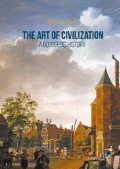Abstract
Revolutionary Period and Romanticism, 1780–1825
Romanticism marks the breakdown of the period 1600–1800 of state-controlled art especially in France. After the Revolution, the reign of ideology gives way to the age of ideologies. Then people recognize their own moral habits as adopted forms. In the ensuing uncertainty, and with a liberalized market of forms and ideas to draw from, romanticism emerges—touting emotional sincerity and rebellion. In reality, this emotionalism harbors a deeply detached mindset that treats all experience as spectacle and ideas as aesthetic options. As for rebellion, romanticism is really a poeticized image of bourgeois opportunism and adaptability. The poetic is the productive: thus, romanticism enables the shift from a social economy of want to one of desire and self-realization.
Access this chapter
Tax calculation will be finalised at checkout
Purchases are for personal use only
Notes
- 1.
Carlyle (1888), vol. I, pp. 20–24.
- 2.
Seznec (2010), p. 7.
- 3.
Voltaire, Temple du goût (c.1732); La Font de Saint-Yenne in Harrison (2000), p. 558.
- 4.
Reynolds (1992), p. 230.
- 5.
Rousseau, ‘Discourse on the Arts and Sciences’ in (2011), p. 14.
- 6.
Rousseau, ‘Letter to d’Alembert on the Theater’ (2004), vol. X, p. 298.
- 7.
Rousseau, ‘Discourse on the Arts and Sciences’, p. 7.
- 8.
Ibid., p. 6.
- 9.
In David (1880), p. 117.
- 10.
Ibid., p. 157.
- 11.
Ibid., p. 149.
- 12.
In McClellan (1999), p. 91.
- 13.
In de Goncourt (1880), p. 346.
- 14.
In David (1880), p. 151.
- 15.
In Holt (1958), p. 45.
- 16.
In Wildenstein (1973), #428.
- 17.
Lajer-Burchart (1999), pp. 9–10.
- 18.
In Wildenstein, #1143.
- 19.
Burke [1756], p. 36.
- 20.
Kant (2000) p. 75.
- 21.
Ibid., p. 81.
- 22.
Schiller, ‘On the Sublime’, in (1993), p. 74.
- 23.
Kant (2000), p. 75.
- 24.
See Levine (2001), pp. 294–299.
- 25.
In Millington (1849), p. 145.
- 26.
Wordsworth (2005), p. 199.
- 27.
Forman (1889), p. 210.
- 28.
Schlegel, Lyceum, Fragment 42.
- 29.
Schlegel (1972), p. 361.
- 30.
In Furst (1980), p. 34.
- 31.
See Hobsbawn (1983).
- 32.
Rousseau, Emile, or On Education, [1762] (1979), p. 433.
- 33.
Robert Sayre (2001), pp. 36, 248.
- 34.
Goethe [1774] (1989), p. 76.
- 35.
Bailey (2006), p. 276.
- 36.
Kant (2000), pp. 145, 62.
- 37.
In Boswell [1791].
- 38.
Kant (2000), p. 69.
- 39.
Humboldt [1792] (1851), p. 11.
- 40.
Allen (2009).
- 41.
Schelling [1797].
- 42.
Friedrich Schiller [1794], (1990), p. 50.
- 43.
McLeod (1998), p. 108.
- 44.
On the meaning of the poetic in romanticism, see Ferber (2005), pp. 552–570; and Lindenberger, ‘Literature and the other Arts’, in Brown (2000), pp. 362–386.
- 45.
Schlegel [1797] (1991), pp. 31–32.
- 46.
Ibid., p. 31.
- 47.
In Hauser, vol. III, p. 171.
- 48.
Schmitt (1986).
Author information
Authors and Affiliations
Copyright information
© 2016 The Editor(s) (if applicable) and The Author(s)
About this chapter
Cite this chapter
Maleuvre, D. (2016). The Time of Ideologies. In: The Art of Civilization. Palgrave Macmillan, New York. https://doi.org/10.1057/978-1-349-94869-7_9
Download citation
DOI: https://doi.org/10.1057/978-1-349-94869-7_9
Published:
Publisher Name: Palgrave Macmillan, New York
Print ISBN: 978-1-349-94868-0
Online ISBN: 978-1-349-94869-7
eBook Packages: Literature, Cultural and Media StudiesLiterature, Cultural and Media Studies (R0)

